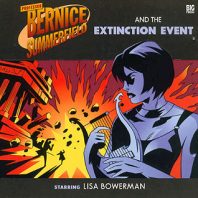
Released July 2001
Traveling to an exclusive auction house with Irving Braxiatel to assess and acquire for the Braxiatel Collection the only known object that survived the destruction of the planet Halstad, Professor Bernice Summerfield soon learns that the Halstad harp is a portent of doom as a dark conspiracy and desire for revenge unfold within ‘The Extinction Event’ by Lance Parkin.
The gradually revealed story of Halstad sets a fascinating backdrop for this story, a planet of ash at the edge of space that cosmic radiation destroyed some seven years ago. With the seas boiled away and the musically-inclined humanoid settlement completely destroyed in an instant with no evidence of having ever existed other than this singular harp that the known collector Braxiatel wishes to mark as authentic, the auction house provides the perfect setting for the truth behind Halstad’s destruction to be called into question. In a sale centred around civilisations that suddenly died out, Braxiatel knows that showing any interest in an item will instantly cause its price to skyrocket, and this ambiguous figure who comes off as more of an efficient businessman than in the novels is brought to life spectacularly by Miles Richardson right from the start.
Tensions rise immediately following the attempted assassination of the Gulfrarg ambassador who is such a respected frequenter of this auction house despite his vile appearance and langauage, and the story that ensues from the fleeing man who is reminded of his deceased lover by Bernice’s voice is both preposterous and harrowing in equal measure. Contrasting nicely with the harsh expletive-filled aliens tones of the Ambassador that Mark Donovan delivers with such gusto, Daniel Brenna imbues Hulver with a much more measured and rational tone, making his tale of being abducted and subjected to experimentation at the hands of the Gulfrargs before the Ambassador ordered the destruction of his world all the more believable, the motive being pure profit as scarcity and the lack of any legal claim to any property coincide. Of course, in any auction house it’s the auctioneer who stands to make the most profit, and so it’s entirely reasonable that this heinous scheme was not devised and put in motion by one mind alone despite the very personal vendetta that fuels Hulver that is only intensified by the Ambassador’s holding of his harp.
As strong as the personal motivations of Hulver are to carry the plot, however, there are some areas that are a bit more circumspect. There’s nothing ever made of the fact that Bernice sounds like Hulver’s dead lover except to give these two a reason to momentarily connect under strange circumstances, and the Gulfrarg are written so blatantly evilly from the very start that it comes as absolutely no surprise whatsoever that they truly are so blatantly evil that they would destroy entire worlds to turn a tidy profit. While this perhaps plays on the expectations of a more profound villainous motive given how nuanced Big Finish villains tend to be, it means that a lot of the discussion about whether or not the ambassador is capable of the charges put against him are ultimately filler with little meaningful weight. Still, these are relatively minor quibbles in a well-acted and well-directed play that uses the most of its small cast and confined environment to maximise the inherent drama to create a distinct personal danger for Bernice and an immense momentum that hopefully continues on into future releases- along with the morally ambiguous but ultimately heroic Braxiatel- as well.
- Release Date: 7/2001


Leave a Reply